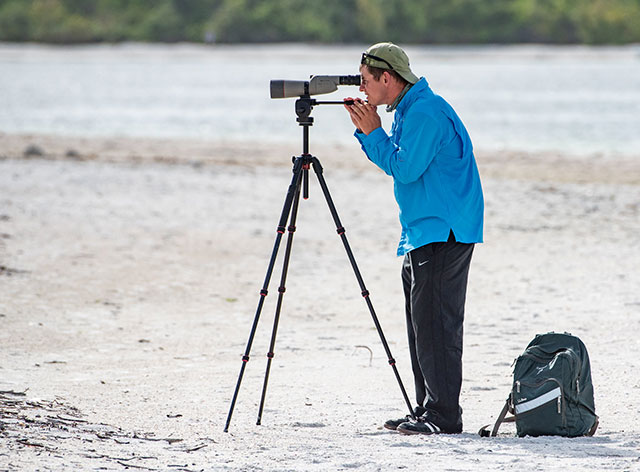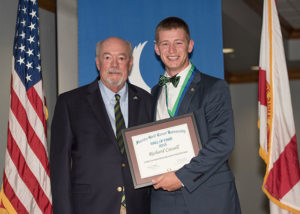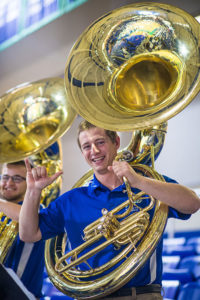Ricky Cassell’s job is a walk on the beach — literally.
As a shorebird biologist for the Florida Fish and Wildlife Commission, the 2018 FGCU graduate spends his days monitoring the safety, numbers and behavior of snowy plovers, Wilson’s plovers, least terns and black skimmers. During nesting season, these and other species favor the same sandy Gulf shores that attract hordes of beachcombing tourists who may, unintentionally or not, disturb the delicate balance of survival for our feathered friends.

“Most of them are threatened species, so the numbers are very important,” Cassell says. “My job is to find different nesting birds and to mark off these areas so people don’t step on them, to make sure they’re doing OK and have their peace. I also educate people about shorebirds. A lot of people are interested and full of questions.
“I’m loving it. I’m outside every day. Every time I’m out there I see something new.”
Least terns, for example, become very protective of their nests and will dive bomb intruders while screeching at them, Cassell has learned. Plovers, meanwhile, are known to deploy a “broken wing display,” feigning injury to distract predators from their nests or young.
“If you notice these behaviors, think about where you’re walking. These are all signs indicating nesting is nearby,” he says. “So, as you are strolling on the beach, be aware of what is going on around you. It is important for these birds to focus their time and energy on nesting and taking care of chicks rather than having to worry about people walking or sitting too close to their nesting areas.”
Many of these birds have long migratory journeys before and after the nesting season, so any extra energy expenditure could take a toll on their populations.
Observing avian behavior and schooling the public as a professional biologist is a natural extension of Cassell’s undergraduate experiences. He educated peers as a campus naturalist and completed a sea turtle conservation internship at Cayo Costa State Park. An FGCU Hall of Famer, he amassed more than 400 service-learning hours — well beyond the minimum 80 hours — on the way to earning an Excellence in Civic Engagement Award. Cassell also found time to lead the Habitat for Humanity Campus Chapter as well as the brass section of the Basketball Pep Band on tuba.
[ Part of a series exploring how service-learning influences careers ]
A lifetime nature lover and outdoorsman from Grass Lake, Mich., who was attracted to FGCU’s natural surroundings and sustainability ethos, Cassell spent most of his service-learning hours during his junior and senior years working with a species wildly different from those he observes and protects now. The Talkin’ Monkeys Project became his passion project — and a stepping stone to his current career.

This federally licensed sanctuary near Lake Okeechobee, about 70 miles inland from the FGCU campus, cares for neglected or abused primates such as monkeys and gibbons as they live out of their days. The nonprofit also educates the public about the perils of extinction for non-human primates.
Surrendered by pet owners or released from breeding or research facilities, these cast-off critters would have nowhere to go if not for Talkin’ Monkeys, according to Cassell.
“As a biology major with a concentration in organismal and ecological studies, this was the perfect place for me to volunteer to get my service-learning hours at FGCU,” he says. “Service-learning is getting out into the community and putting everything that you’re learning in the classroom into practice, but also gaining different experiences, which is why they also call it experiential learning. It’s making a difference in the world.”

Learning from experts on staff – as well as from feeding and observing primates firsthand — proved to be helpful after graduation. Like many alumni, Cassell found the skills and character built through service-learning can open doors to professional opportunities.
“All employers are looking for experience, and it’s really hard to get experience while you’re also taking a whole bunch of classes getting your undergraduate degree,” he says. “What you really have to do is volunteer. I was able to get this job because of some of the experiences that I had (at Talkin’ Monkeys). The key is finding something that you’re passionate about. The more you put into it, the more you’ll get out of it. So if you invest time into something that you’re passionate about and something that you really like, the opportunities will start opening up, and who knows where it could lead to.”